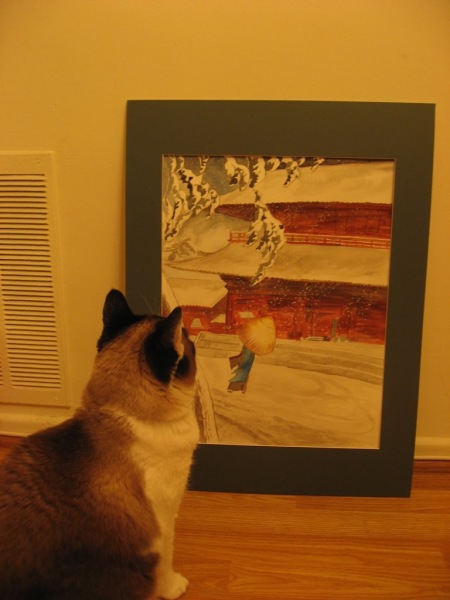
There is a wonderful little book by Churchill (one of my heroes) on painting. He started painting at 40 and was actually very good, winning many awards (under an assumed name). This was in addition to winning the Nobel prize for literature and being the prime minister of UK in very tough times. Way to multi-task!
Well, I like to paint too and I have done very little since Iridescent began. With the economy the way it is, I needed a way to de-stress and protect my stomach ulcers, so I began again. I love Japanese woodblock prints and here is my little attempt at learning from the masters (Kawase Hasui, 1883-1957). At least my cat admires it.
Here are some of my favorite passages from Painting as a Pastime. Please get it and read it!
“Change is the master key. A man can wear out a particular part of his mind by continually using it and tiring it,
just in the same way as he can wear out the elbows of his coat. There is, however, this difference between the living cells of the brain and inanimate articles: one cannot mend the frayed elbows of a coat by rubbing the sleeves or shoulders; but the tired parts of the mind can be rested and strengthened, not merely by rest, but by using other parts.”
“Broadly speaking, human beings may be divided into three classes: those who are toiled to death, those who are worried to death, and those who are bored to death. It is no use offering the manual labourer, tired out with a hard week’s sweat and effort, the chance of playing a game of football or baseball on Saturday afternoon. It is no use inviting the politician or the professional or business man, who has been working or worrying about serious things for six days, to work or worry about trifling things at the week-end. As for the unfortunate people who can command everything they want, who can gratify every caprice and lay
their hands on almost every object of desire for them a new pleasure, a new excitement is only an additional satiation.
It may also be said that rational, industrious, useful human beings are divided into two classes: first, those whose work is work and whose pleasure is pleasure; and secondly, those whose work and pleasure are one. Of these the former are the majority. They have their compensations. The long hours in die office or the factory bring with them as their reward, not only the means of sustenance, but a keen appetite for pleasure even in its simplest and most modest forms.
But Fortune’s favoured children belong to the second class. Their life is a natural harmony. For them the working hours are never long enough. Each day is a holiday, and ordinary holidays when they come are grudged as enforced interruptions in an absorbing vocation.
Yet to both classes the need of an alternative outlook, of a change of atmosphere, of a diversion of effort, is essential. Indeed, It may well be that those whose work is their pleasure are those most need the means of banishing It at intervals from their minds.”
~Winston Churchill, Painting as a Pastime

